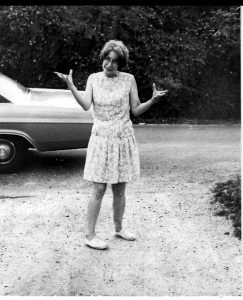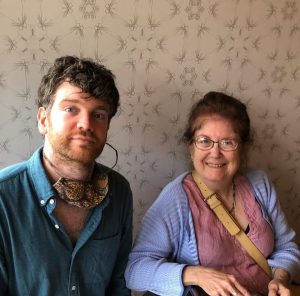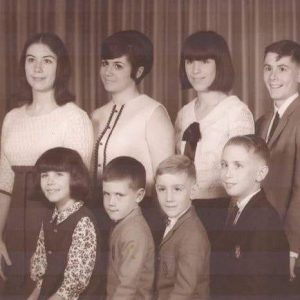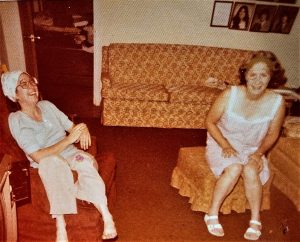As a child, I had four ambitions: To get a poem published in the New Yorker; to be a kindergarten teacher; to live happily-ever-after; and to have six children. I accomplished none of these goals, although I’m still working on that third one.
My mother supported my dream of being a writer. In her earlier days as an EKG technician at St. Louis County Hospital, she took one or the other child to work with her during the summer. Of course, her goal focused on having fewer bodies in the line of my father’s hungover wrath, but I gleefully volunteered whenever I got the chance.
There, I would cut EKG lead strips (in the days before computers) to mount them on report pages, organize storage shelves, and, joy of joys, use her typewriter without interruption from a curious little brother. That hospital office, with its curtained cubby for walk-in clinic patients, saw the first stacks of paper bearing the transcribed scribblings of a poet wannabe, before I realized that my feeble attempts at verse barely rose to the level of amateur.
Mother praised each short, structured missive. When I had a project to submit some of them in English class, she organized and typed them herself, deeming herself superior in the hammering which produce clean copy. The heavy strokes necessary to force key to page challenged my small hands. She got a yellow three-pronged folder from the cabinet and showed me how to use the hole-puncher. We created a book of my poetry. I cherished that folder until it finally succumbed to the vagaries of time or too many moves.
Over the years, I dabbled in poetry. Eads Magazine in St. Louis published three of mine as a trio. My mother insisted that I bring multiple copies of the edition to her. She mailed them to unsuspecting relatives who feebly thanked her, I’m sure, and threw the issue into the basket on the floor by the couch. I often wonder how shocked they would be to know that the imagery of the third verse referred to a miscarriage that I had in my mother’s bathroom. “A child, once real, then gone” read one line. My mother and I never spoke of it but she herself had nursed me through that episode just months before I submitted the lot for consideration.
I wrote several poems about my mother. She never read them. One I wrote during a period of uneasy alliance between us; another I composed after her death. I do not know how she would have felt about the approach that I took to these odes to her resilience and my affection for her. But every fiber of my being sings of her legacy. All that I am; the choices that I’ve made; the way in which I make decisions; rises and falls on the strength I inherited from her. Even my mistakes echo some that I realize she herself indulged. My faults come from her but so does my endless capacity to forgive others, to nourish even the tiniest flicker of hope, and to open a window wide enough to allow healing breezes to fill the cramped space of my damaged heart.
Although I did not raise six children, the universe gifted me with one. Some would say that I emulated my mother’s clumsy parenting in both its virtues and its flaws. I do not speak for Patrick on the issue. I struggled with parenting, though I unquestionably experienced the unbridled, unconditional love that a better poet might more deftly describe. Perhaps that love drove me to fear loss so intensely that I fumbled the rest. Perhaps my own damaged spirit never stood a chance to truly excel at raising any child. Either way, I do not excuse any remission by blaming my own childhood. I only pray, to paraphrase the words of Murry Burns, that my son speaks well of me when the opportunity to speak at all arises.
I can honestly say that I see a lot of my mother’s gentle spirit in my son. If a village helped me raise Patrick, my mother’s genes supported his psyche as he navigated the white waters of the home that I created. For my part, I tried to channel the humor and perseverance of my mother’s style. I realized early in my son’s toddlerhood that I could never have raised six children. My admiration for my mother’s determination to bring the eight Corleys from infancy to adulthood bloomed as I struggled with just the one.
My mother’s greatest strengths revealed themselves in crises, large and small. When a car struck me during my second year of law school, consigning me to a two-month stint in the hospital, Mom used all her vacation time to move herself and my father from St. Louis to Kansas City. She camped in my apartment, made friends with the neighbors, and collected notes from my professors. She dragged my father to my hospital room and greeted my visitors. When one teacher asked if the accident had damaged my good leg or my bad leg, she loudly informed him that she hadn’t known I had a good leg and then uproariously laughed at her own joke.
Mother’s Day provides an opportunity to honor my mother. But I try to let my admiration of her shine in everything I do. I hope the best of her endures in me. I certainly strive to bring it forward. Time will tell if I have faithfully credited my mother’s example. Until then, I shall just endeavor to put my best foot forward.
It’s the twelfth day of the one-hundred and twenty-fifth month of My Year Without Complaining. Life continues.
From A Daughter
What do I say to this woman
sitting across from me
over a society lunch?
What do I say to one
who changed my diapers,
and coaxed me through a pre-adolescent limp
and post-pubescent cramps?
How do I treat someone
who learned to drive at 40,
fought the maybe-giants and
organized picnics
When she wasn’t at work,
or scrubbing floors
or despairing?
There are no words for one
who is too familiar
with emergency rooms,
airports, and
Jails.
So I sit, choking on idle conversation
about the silver market
and over-sprouted beans,
neither of which I understand.
If I appear tense
it is because I also choke
on unexpressed devotion
and overwhelming sorrow.
© M. C. Corley, 1980, 2024
- Lucille Johanna Lyons Corley
- My son and me in St. Louis, May 2022
- The eight Corleys
- My mother & me having facials.
- Mother and me at Bissel House, c. 1973




